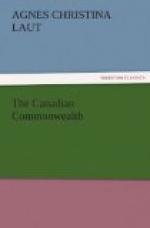At time of writing, to an outsider, there is in practice no difference between the two parties; but this can hardly remain a permanent condition. As long as the war lasts both parties will be a unit in support of Imperial defense. The day the war is over Canada may have to consider, not Imperial, but Dominion defense; and this is bound to split the parties up on entirely new lines. The French Nationalists are for standing aside from all European entanglements and resting secure under the Monroe Doctrine. The two million Americans in the West may be expected to advocate the same policy. The British and the Canadians of British descent in Canada may be expected to take an aggressive stand for active self-defense; for defense may be one of Canada’s next big problems.
Up to the present, Canadians have considered it a superiority that their constitution—the British North America Act—could be so easily amended. As long as Canada is peopled by Canadians, it is an advantage to work under a constitution that may be modified to suit the growing need of a growing nation, but one is constrained to ask what if Galicians and Germans ever acquired the balance of voting power in Canada? There are half as many German-born Germans in the United States as there are native-born Canadians in Canada. What if such a tide of German immigration came to Canada? Would it be an advantage or a disadvantage that the country’s constitution could be so easily amended by the Imperial Parliament? Or more striking still, suppose the Hindu, a British subject, began peopling Western Canada by the million. Suppose the Hindu, a British subject, voted in Canada for a change in the constitution! Can one conceive for one minute of the Imperial government refusing to amend the British North American Act? Canadians sometimes refer to the American Constitution as too




